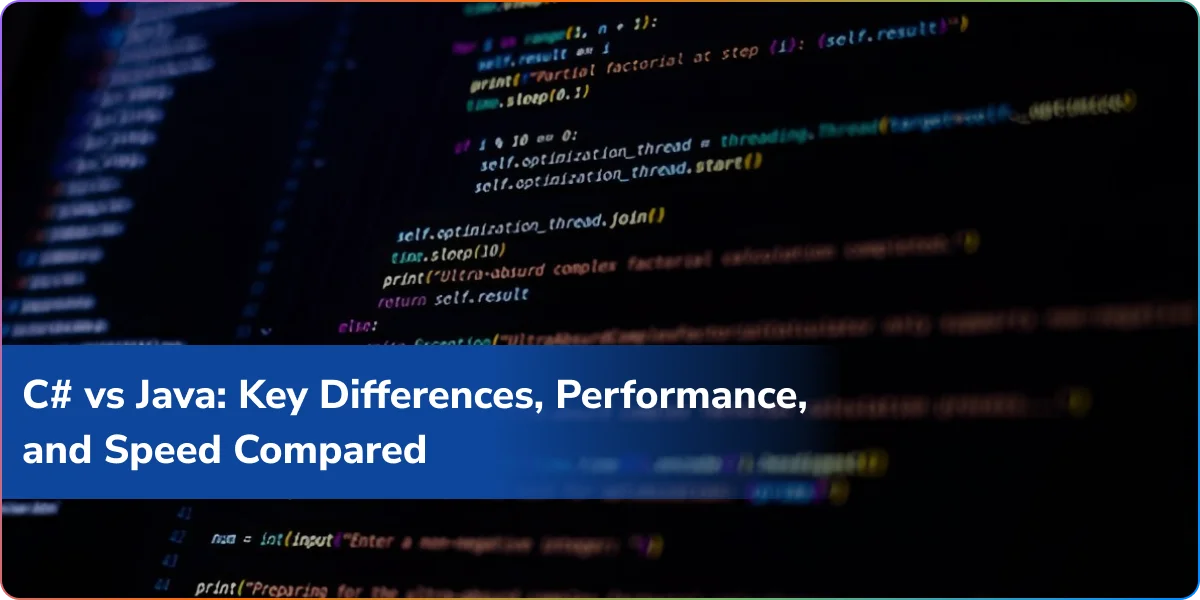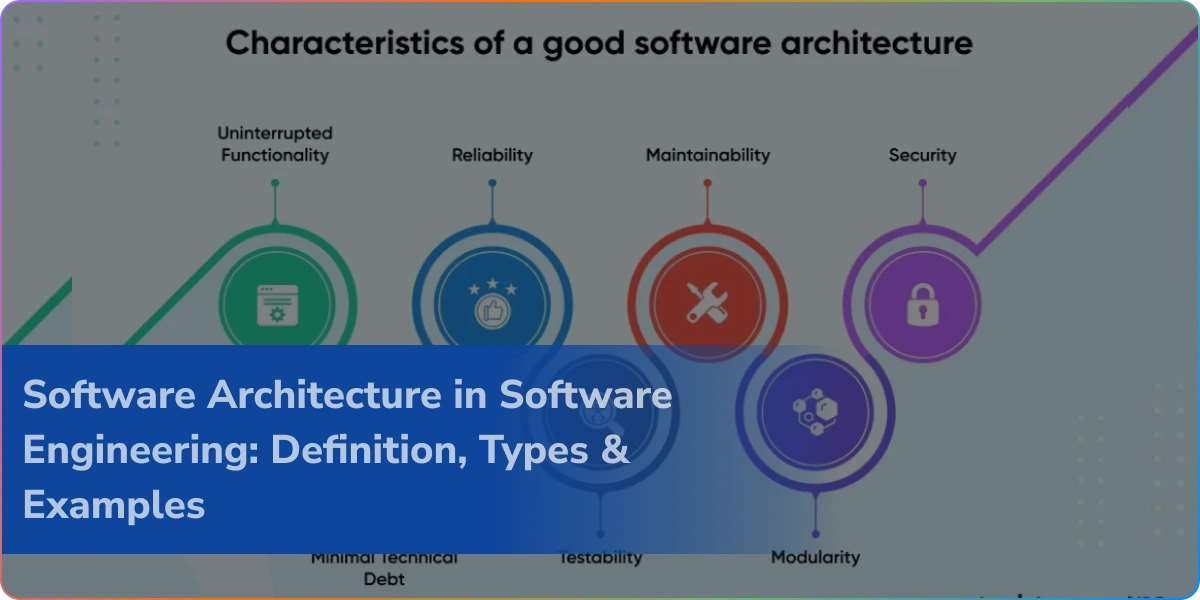In the constantly changing world of software programming, selecting the appropriate programming language is a decision of paramount importance. Of the most debated options are C# and Java. Both are robust, object-oriented languages with enormous ecosystems, extensive community backing, and enterprise-level applications. However, each has a distinct set of strengths and best use cases.
This blog covers in-depth information on difference between C# and Java , C# vs Java performance analysis, Java vs C# speed comparison, and assist you in choosing the correct language for your next project.
1. Introduction to C# and Java
What is C#?
C# (spoken as C sharp) is a contemporary, object-oriented programming language created by Microsoft in the early 2000s. It’s a part of the .NET framework and is used extensively for Windows application development, game development using Unity, enterprise software, and beyond.
What is C# used for?
- Windows desktop applications
- Web applications (using ASP.NET)
- Game development (Unity Engine)
- Mobile apps (Xamarin)
- Cloud-based services (Azure)
What is Java?
Java is an object-oriented, class-based programming language created by Sun Microsystems in 1995 (now part of Oracle). Its “write once, run anywhere” philosophy is realized with Java code, which is compiled into JVM-executable bytecode to run on any device with the Java Virtual Machine (JVM).
Java is commonly used for:
- Web applications
- Android apps
- Enterprise-level systems
- Embedded systems
- Server-side development
2. Syntax and Language Design
Syntax is one of the initial points of consideration in C# vs Java.
- C# syntax tends to be cleaner and more compact thanks to properties, events, and lambda expressions.
- Java is marginally more verbose, but it never becomes complicated and is very easy to learn for a newcomer.
Is C# like Java?
Yes, Java and C# are very much alike in most respects. Both have garbage collection, strong typing, object-oriented concepts, and multithreading. Their error handling, loop, and conditional syntax are nearly the same.
Key differences:
- C# provides more contemporary language features such as LINQ, dynamic typing, and async/await.
- Java focuses on cross-platform portability and more basic build tools.
3. Platform Independence and Ecosystem
Java’s Cross-Platform Advantage
The fundamental strength of Java is its platform independence. It is executed on the Java Virtual Machine (JVM), which exists for nearly all operating systems. This renders Java a leading option for applications that have to execute equally across various systems.
C#’s Integration with Microsoft
C# originally started out as Windows-specific development, heavily integrated with the .NET framework. Yet, with the advent of .NET Core and more recently .NET 5/6/7, C# itself has gone cross-platform, being executed on Linux, macOS, and even mobile devices through Xamarin.
Still, Java enjoys wider cross-platform popularity because it is an older player in the multi-platform field.
4. Performance: C# vs Java Performance Comparison
C# and Java performance is actually very comparable for the majority of use cases. Yet, implicit nuances will surface depending on the runtime environment and load.
Execution Models
- C# is compiled to Intermediate Language (IL), which is executed on the Common Language Runtime (CLR).
- Java is compiled to bytecode that executes on the Java Virtual Machine (JVM).
Both JVM and CLR employ Just-In-Time (JIT) compilation, compiling code at runtime. Performance variations typically rely on the quality of implementation, efficiency of garbage collection, and runtime optimization.
Real-World Performance Benchmarks
- When it comes to computationally demanding operations, C# tends to surpass Java in Windows-based systems based on greater system integration.
- Java should fare better on Linux or macOS platforms based on traditional JVM optimizations.
- When it comes to web and enterprise scenarios, the difference is imperceptible.
In conclusion, C# vs Java performance comes very close to being neck-and-neck, and one should not decide between the two solely based on raw speed.
5. Speed Comparison: Java vs C# Speed
When comparing Java vs C# speed, developers usually talk about how applications execute fast or how fast developers can develop them.
Java speed vs c is very platform-dependent.
- On Linux servers, Java might be faster with mature JVM optimization.
- On Windows servers, C# might be faster because of deep system-level integration.
Development speed
On how fast developers can develop applications:
- C# takes the win when utilizing tools such as Visual Studio, providing top-notch IntelliSense, debugging, and UI creation.
- Java programmers tend to use IntelliJ IDEA, Eclipse, or NetBeans. Though powerful, they are not as polished as Microsoft’s IDE.
So, in Java vs C# speed, the decision is:
- Execution speed: Similar, with variations by platform.
- Development speed: C# can provide a smoother experience with Microsoft’s environment.
6. Tooling and Development Environment
C# Tooling
- Visual Studio (industry-leading IDE for C#)
- Rider (cross-platform competitor)
- .NET CLI tools
Java Tooling
- IntelliJ IDEA (solid and highly used)
- Eclipse (common in enterprise environments)
- Maven and Gradle (for build automation)
Both ecosystems provide excellent tooling, but C#Visual Studio excels in both UI design and developer productivity, particularly for desktop and enterprise software.
7. Job Market and Community
Both languages possess robust worldwide job markets and communities.
C#
- Used extensively in Windows enterprise environments
- Used for game development (Unity) of choice
- High demand in enterprise software firms implementing the Microsoft stack
Java
- Holds sway in Android app development
- Used extensively in banking, insurance, and government software
- Heavy usage in big data (through Hadoop), cloud, and distributed systems
As far as job opportunities go, C# or Java are both extremely viable. The decision will ultimately come down to which industry and platform you’re working towards.
8. Security and Stability
The two languages are both security-aware, providing:
- Type safety
- Exception handling
- Automatic memory management
Java tends to win out on long-term stability due to its continued backward compatibility. C#, though, is closing in with LTS (Long-Term Support) releases on the .NET platform.
9. Ease of Learning and Usage
- Java is commonly suggested for novices because it has simple syntax and enormous learning materials.
- C# is simple to learn as well but has a more sophisticated feature set, which may intimidate complete novices.
However, both languages are great options for learning object-oriented programming concepts.
10. Use Cases Comparison
Use Case Preferred Language
Windows Desktop Apps C#
Cross-Platform Web Apps Java or C# (.NET Core)
Android Development Java
iOS/Android via Xamarin C#
Game Development C# (Unity)
Enterprise Software Both
Cloud Services Both (Java with AWS, C# with Azure)
11. Final Verdict: C# or Java – Which One to Choose?
If you’re still confused about which language to choose in the C# vs java battle, here’s a brief list based on objectives:
Pick C# if:
- You work within the Microsoft ecosystem
- You want to create games (Unity)
- You wish to take advantage of Visual Studio
- You prefer a shiny new, feature-packed language
Pick Java if:
- You desire ultimate cross-platform portability
- You’re developing for Android devices
- You’re developing in finance, telecom, or enterprise domains
- You prefer an old-school, tried-and-tested language with extensive history
Conclusion
Whether you like C sharp compared to Java for Windows development, or are inclined towards Java for its unparalleled cross-platform penetration, you can be assured that you’re selecting a tried and tested, mature and future-proof technology stack. Let us know what your choice is in the comments section below.
Finally, in the C# vs Java race, there’s no one-size-fits-all winner—merely the optimal choice for your individual development journey. Are you a startup or an established company looking to develop games, enterprise domains etc which require C# and Java expertise? Look no further, as we at Logixbuilt Solutions have top-notch talent for C# and Java who can surely bring your ideas to fruition. Let’s connect to discuss the project right away.
FAQ
1. Is C# similar to Java?
Yes, C# and Java have numerous similarities like object-oriented design, syntax structure, and runtime environments. C# has more contemporary features and is highly integrated into Microsoft’s ecosystem, but Java is better at platform independence by using the JVM.
2. Which one is faster: Java or C#
Java versus C# speed is very much environment-dependent. C# can be faster on Windows because it is optimized for .NET, whereas Java is faster on Linux boxes. In actual usage, both are about the same.
3. Where is C# utilized?
C# is applied to numerous applications such as Windows desktop applications, web applications (through ASP.NET), mobile applications (through Xamarin), game development (Unity), and cloud-based applications (Azure).
4. What is the biggest difference between C# and Java?
C# and Java differ in platform integration, tools, and ecosystem. C# is close to the .NET framework and is excellent for Windows development, whereas Java is platform-independent and widely used for Android applications and enterprise applications.
5. Should one learn C# or Java in 2025?
It depends on your goals. Choose C# if you’re working within Microsoft environments or want to develop games. Choose Java if you’re targeting Android, cross-platform applications, or enterprise systems. Both languages are excellent and in demand.



